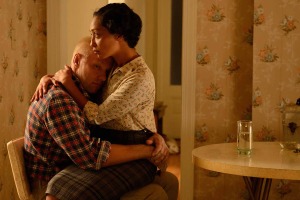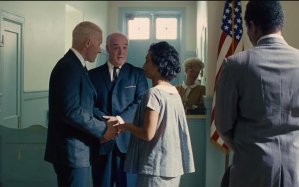Director Jeff Nichols quietly tackles the subject of racism by holding up one Loving couple. Richard and Mildred Loving (their real last name) went to jail in Virginia in 1958 just for being married. Well, for being married to each other. For being married to a person of a different race than their own.
 The movie’s success lies in what a small, personal story this is. We never feel like the whole south is against them – but it feels worse that it must be one of their neighbours who keeps ratting them out. The police come, guns drawn, to break down their door in the middle of the night in order to catch them in a crime – that of sleeping next to itch other in marital bliss.
The movie’s success lies in what a small, personal story this is. We never feel like the whole south is against them – but it feels worse that it must be one of their neighbours who keeps ratting them out. The police come, guns drawn, to break down their door in the middle of the night in order to catch them in a crime – that of sleeping next to itch other in marital bliss.
Richard Loving is the world’s quietest man, and Joel Edgerton has quite an uphill battle to portray him and not come off as unemotional. Ruth Negga exudes talent beside him as his wife, Mildred, who is also shy and meek but the talkier of the two out of necessity. Neither wants any trouble. You get the sense they’d be happy not to challenge anything if only they could be left alone. But in order to avoid prison they get exiled from the entire state of Virginia for 25 years. 25 years of raising their babies with no parents, siblings, or friends around to watch. Their love of family is what encourages them to push back, with the help of a nervy lawyer from the ACLU (Nick Kroll). He wants to present the case to the Supreme Court. He’s ready to fight against discrimination and prejudice. Richard and Mildred just want to be married.
Jeff Nichols embraces their humble nature and keeps his movie similarly  reserved. There’s not a lot of grandstanding. In fact, he turns his back (and his camera) away from the big, sweeping court scene in order to keep it once again in the heart of the family. Easily eliciting a flood of emotions, it’s actually a relief to see them played out so superbly on Negga’s face, and in Edgerton’s shoulders, rather than some melodramatic speech. The restraint here is a credit to Nichols’ directing, but also to this wonderful casting.
reserved. There’s not a lot of grandstanding. In fact, he turns his back (and his camera) away from the big, sweeping court scene in order to keep it once again in the heart of the family. Easily eliciting a flood of emotions, it’s actually a relief to see them played out so superbly on Negga’s face, and in Edgerton’s shoulders, rather than some melodramatic speech. The restraint here is a credit to Nichols’ directing, but also to this wonderful casting.
The decision in their case, Loving v. Virginia, was not unanimous, but they did declare Virginia’s “Racial Integrity” law to be unconstitutional, which voided similar laws in other states as well. Actually, it’s the Loving v. Virginia case that was cited in the 2015 decision to allow same-sex marriage as well. Richard and Mildred, two humble people who just wanted to be a family, allowed the same for countless others.
It’s the kind of movie you’ll want to applaud.

Well, I am getting to be a bigger fan of Edgerton these days and I do like Ruth Negga; sounds like a great film.
Also interested in seeing another Jeff Nichols film after Midnight Special . . .
LikeLike
And Michael Shannon’s in this as well!
LikeLiked by 1 person
Gonna tune in to this one!
LikeLike
TIFF premiere – all about selfies
LikeLiked by 1 person
LikeLiked by 1 person
LikeLike
LikeLike
LikeLike
LikeLike
trailer:
LikeLiked by 1 person
This sounds good Jay (and preferable to dead dogs 🙂 )
LikeLike
I love Nichols’ films. Can’t wait to see this.
LikeLike
This one looks really good, so reckon I’ll be seeing this one for sure.
LikeLike
yep yep yep this is on the list!!!!!!!
LikeLike
Being in a mixed marriage myself, this is one I was waiting for!
LikeLike
Pingback: Golden Globe Nominations | ASSHOLES WATCHING MOVIES
Pingback: Oscar Nominations 2017 | ASSHOLES WATCHING MOVIES
Pingback: Guess Who | ASSHOLES WATCHING MOVIES
Pingback: Cam | ASSHOLES WATCHING MOVIES
Pingback: ASSHOLES WATCHING MOVIESBlack Stories Matter
Pingback: The Loving v. Virginia Supreme Court Case (and Summary) on Interracial Marriage - The Legal Bottom Line by Maureen Gil